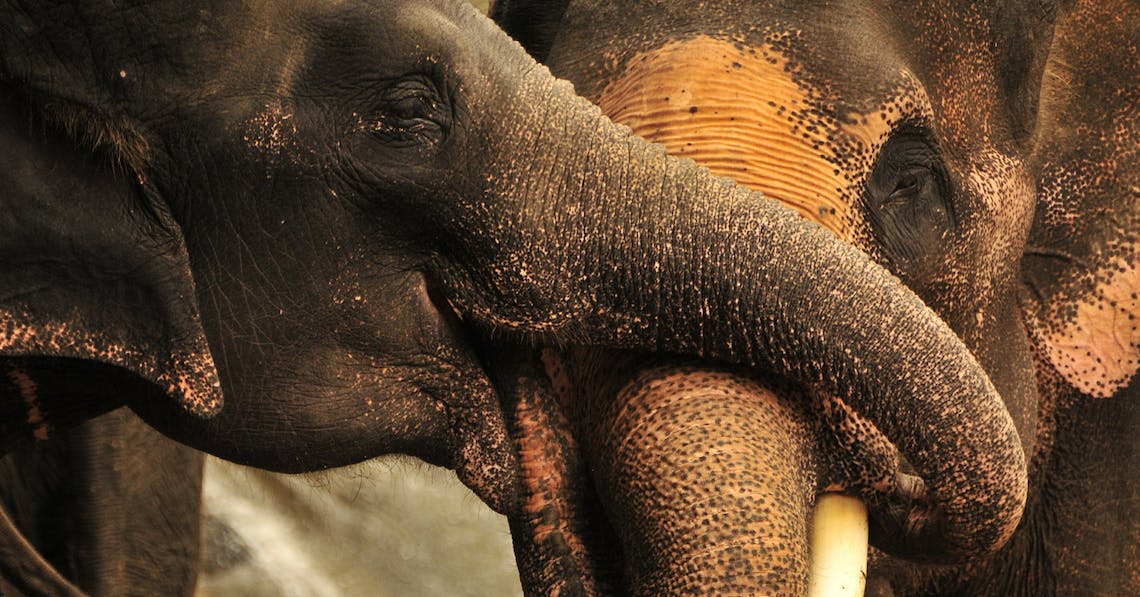A letter was sent out to the media this week from the Elephant Nature Park, quoting owner Lek Chailert, who says she has been visiting many elephant parks across Chiang Mai where she saw that, “Elephants have been chained up since the tourists stopped coming. They are very stressed and upset. Some have started to attack each other from being chained up all day and several have bite wounds as they are fighting over food. The pregnant elephants are also stressed and not doing well at all.”
At the same time a New York Times article was published three days ago, reporting that 85 elephant attraction businesses have now shut down across the north of Thailand, leaving thousands of elephants without a job and a very bleak future.
“Everybody is either totally out of money or soon to be,” said Richard Liar, an Asian elephant specialist who has spent years working in the industry. “There is no money to pay the staff, the mahouts, the doctors, not even for food for the elephants. This is a very grim situation.”
Lair went on to say that Thailand has 3,700 captured elephants, most of which work in the tourism industry that has now ground to a halt.
“We will see more and more elephants on the streets, walking down highways trying to get home with their mahouts, and more elephant camps going bankrupt. There are going to be all sorts of problems,” continued Lair. “I see people solicit donations, but to tell you the truth where would you send the money? There is no credible central organization to distribute it and also it would require huge sums of money. It is in the hundreds of thousands if not millions of dollars.”
“The Thai Elephant Conservation Centre in Lampang is ok because they’re government,” Lair added. “The private camps are the ones affected. We have to remember that probably about 97% of the elephants in this country are privately owned. There are probably around 1000 really vulnerable elephants in Thailand right now.”
Anchalee Bunarat, Managing Director of Mae Sa Elephant Camp, the most established elephant attraction in the north which has over 300 staff and cares for 78 elephants agrees that the situation is dire, but she says that elephants, which now are sold at over two million baht each, are too valuable for owners to simply abandon them onto the streets.
“Mae Sa Elephant Camp has huge operating costs since we have our own breeding programme, our own vets and a large staff,” said Anchalee. “I intend to keep this going through this crisis, even if I have to go to a bank for a loan. But I am concerned about the smaller camps with very few resources. Some of these places have only three to five elephants with barely any staff. We all have zero income now but we have to take care of our elephants. The government doesn’t care about these issues anyway; they have no measures to help any of us, so we have to help ourselves.”
Anchalee said that Mae Sae Elephant Camp which, although lauded by many industry professionals for its high quality of elephant care, has also seen many critics of her elephant shows and rides. This has led her to make the decision to change camp operations, by cancelling rides and shows. She has been
looking at turning her business into a more donation-based model such as the highly successful Elephant Nature Park which solicits donations from around the world to support their 3,000 animals which, they say, include dogs and cats.
“This situation has basically forced us to make the change now,” said Anchalee who will take this time to overhaul her 44 year business. We are preparing for change. If people want to donate, then we have to accept. We have always earned our keep with honesty but now we have to beg and follow their [Elephant Nature Park] foundation format.”
“We are the strongest business in the entire industry,” said Anchalee, “but we will soon run out of cash too. We are in a different situation though as we have more reserves and are committed to caring for all our elephants. Our operating cost is still a minimum of 5 million baht per month, which is a lot of money when there is no income coming in at all.”
“Unlike Mae Sa Elephant Camp, which owns all of their elephants, the vast majority of elephant attraction businesses here lease their elephants,” said Joanna Maclean, a board member of the Asian Captive Elephant Working Group. “How is anyone to have enough money to feed the elephants?” she asked. “I think that most will end up going home with their mahouts, which sounds better, but the truth is that they are likely to be chained up since they can’t be allowed to forage and destroy the villagers’ farms. They will become stressed and anxious, so it’s not a good solution. Then there is the fact that vast amounts of elephant feeding ground is on fire.”
